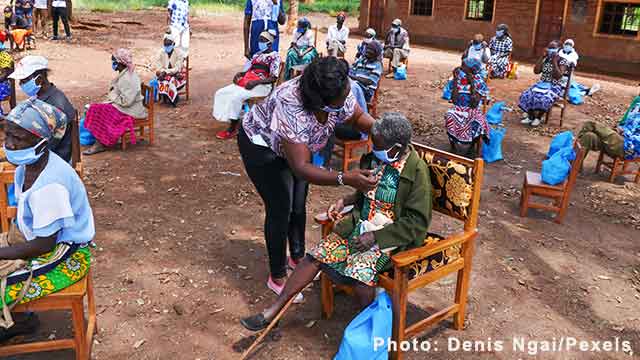The outbreak of the COVID-19 pandemic in late 2019 had a profound impact on the world, disrupting economies, healthcare systems, and daily lives. As nations struggled to combat the virus and its effects, the pandemic highlighted existing social inequalities and brought to the forefront the urgent need for sustainable development and social equity.
Understanding Social Equity and Sustainable Development
Social equity refers to the fair and just distribution of resources, opportunities, and benefits within society. It involves ensuring that all individuals have access to basic needs like healthcare, education, housing, and employment, regardless of their race, gender, socioeconomic status, or other characteristics. On the other hand, sustainable development is the concept of meeting the needs of the present without compromising the ability of future generations to meet their own needs. It encompasses economic, environmental, and social dimensions, aiming to create a balance between growth, environmental protection, and social well-being.
The Impact of COVID-19 on Social Equity
The COVID-19 pandemic has had far-reaching impacts on social equity, exacerbating existing inequalities and creating new challenges for vulnerable populations. Here are some specific impacts of the pandemic on social equity:
Health Disparities: COVID-19 disproportionately affected marginalized communities, including ethnic minorities and low-income individuals. Limited access to healthcare, underlying health conditions, and crowded living conditions contributed to higher infection and mortality rates among these groups.
Economic Inequities: Lockdowns and restrictions led to widespread job losses and economic downturns. Low-income workers, informal laborers, and those in the gig economy faced the brunt of the economic impact, pushing them further into poverty.
Education Divide: With the shift to remote learning, many students lacked access to necessary technology and the internet, deepening the education divide. Children from disadvantaged backgrounds faced challenges in accessing quality education, leading to potential long-term setbacks.
Gender Inequality: Women, particularly those in low-paid and precarious jobs, experienced disproportionate job losses during the pandemic. Additionally, the increased burden of caregiving and domestic responsibilities further exacerbated gender inequalities.
Mental Health Crisis: The pandemic took a toll on mental health globally. Vulnerable populations, such as individuals facing economic hardships and frontline workers, experienced increased anxiety, depression, and stress.
Food Insecurity: Economic disruptions and supply chain issues during the pandemic resulted in food insecurity for many vulnerable households. Access to nutritious food became a pressing issue, especially for low-income families and those dependent on food assistance programs.

Housing Instability: Job losses and financial hardships led to an increase in evictions and homelessness. Vulnerable populations struggled to maintain stable housing during the pandemic.
Digital Divide: The rapid shift to remote work, online education, and telehealth highlighted the digital divide. Many underserved communities lacked access to reliable internet and technology, limiting their participation in the digital economy.
Access to Information: Reliable information was crucial during the pandemic, yet some marginalized communities faced barriers to accessing accurate health-related information due to language barriers or limited internet access.
Social Exclusion: Social distancing measures and lockdowns led to increased isolation for vulnerable populations, particularly older adults and those with disabilities. Limited social interaction further compounded mental health challenges.
The Nexus between Social Equity and Sustainable Development
The nexus between social equity and sustainable development is a crucial aspect of creating a more inclusive, resilient, and just society while safeguarding the well-being of future generations and the planet. Social equity and sustainable development are deeply interconnected, and they must be pursued hand in hand to achieve meaningful progress in addressing global challenges and achieving a better quality of life for all.
Shared Goals: Social equity and sustainable development share common goals of promoting human well-being, improving living standards, and ensuring access to basic needs such as education, healthcare, and clean water. Both concepts aim to enhance the quality of life for present and future generations.
Inclusivity and Participation: Sustainable development emphasizes inclusive decision-making processes, where all stakeholders, including marginalized and vulnerable groups, have a say in shaping policies and projects that affect their lives. By prioritizing social equity, sustainable development seeks to ensure that the benefits and burdens of development are distributed fairly across society.
Poverty Alleviation: Social equity is central to poverty alleviation efforts. Sustainable development recognizes poverty as a multidimensional issue that must be addressed comprehensively, taking into account economic, social, and environmental factors. By lifting people out of poverty and reducing income disparities, societies can become more sustainable and resilient.
Access to Basic Services: Sustainable development seeks to ensure access to essential services such as healthcare, education, sanitation, and clean water for all. By prioritizing social equity, these services can be made accessible to marginalized and underserved populations, narrowing the gap between different socioeconomic groups.
Reducing Inequalities: Social equity and sustainable development both seek to reduce inequalities in society. This includes addressing disparities in income, education, healthcare, and employment opportunities, among others. Reducing inequalities is not only a matter of fairness but also a prerequisite for achieving sustainable and stable societies.
Environmental Justice: Sustainable development recognizes that environmental issues disproportionately impact vulnerable communities. Social equity calls for addressing these environmental injustices by ensuring that marginalized populations are not disproportionately burdened by pollution, climate change, or other environmental hazards.
Empowerment and Human Rights: Social equity and sustainable development are underpinned by the principles of human rights and empowerment. Sustainable development recognizes that empowering individuals and communities is vital for achieving long-term, inclusive, and sustainable change.
Resilience to Shocks: By promoting social equity, societies become more resilient to shocks and crises, such as pandemics, natural disasters, or economic downturns. A fair and just society can better cope with challenges and recover faster, ensuring that vulnerable populations are not left behind.
Social Cohesion: Social equity and sustainable development foster social cohesion by promoting a sense of shared responsibility and collective well-being. This cohesion is essential for overcoming societal divisions and working together to address complex global issues.
Interconnectedness: Both social equity and sustainable development recognize the interconnectedness of various global challenges, such as poverty, climate change, biodiversity loss, and social exclusion. Addressing one issue in isolation is not enough; a holistic approach is required to create lasting positive change.
Building Back Better: The Role of Governments and Civil Society
To achieve social equity and sustainable development in the post-COVID-19 era, collaboration between governments, civil society, businesses, and international organizations is crucial. Some key strategies include:
Policy Reforms: Governments must implement policies that address social inequities, promote equal opportunities, and ensure the protection of vulnerable populations. This may include progressive taxation, social safety nets, and anti-discrimination laws.
Inclusive Decision-making: Involving marginalized communities in decision-making processes ensures that policies are responsive to their needs and aspirations, fostering a sense of ownership and empowerment.
Sustainable Business Practices: Businesses play a vital role in promoting social equity and sustainable development. Emphasizing corporate social responsibility, ethical supply chains, and sustainable production can contribute to a fairer and greener world.
Global Cooperation: The challenges posed by the pandemic and sustainable development require international cooperation and solidarity. Collaborative efforts among nations can facilitate knowledge-sharing, resource allocation, and collective solutions.
FAQs:
-
What is the nexus between social equity and sustainable development?
The nexus between social equity and sustainable development is the interconnectedness between promoting fairness, inclusivity, and reducing inequalities while striving for long-term, environmentally responsible development.
-
How does sustainable development contribute to poverty alleviation?
Sustainable development addresses poverty comprehensively, considering economic, social, and environmental factors, aiming to lift people out of poverty and reduce income disparities.
-
Why is inclusive decision-making important in the context of sustainable development?
Inclusive decision-making ensures that all stakeholders, including marginalized groups, have a say in shaping policies, projects, and development efforts that affect their lives, fostering a more equitable and participatory society.
-
What is the significance of addressing environmental justice in sustainable development?
Sustainable development recognizes that environmental issues disproportionately impact vulnerable communities, and addressing environmental justice ensures that these populations are not disproportionately burdened by environmental hazards.
-
How does social equity contribute to societal resilience during crises?
Social equity fosters resilience by ensuring fair access to resources and services, allowing societies to better cope with shocks and challenges, and recover more effectively without leaving vulnerable populations behind.
